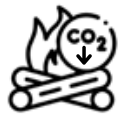
Description of the project: Household cooking sector is the largest consumer of energy in Nigeria, with 80–90% of them using biomass, particularly fuel wood. This causes GHG emissions and air pollution. In a bid to mitigate this, RUWES in partnership with Nexleaf Analytics, identified clean and affordable cookstoves to close the gap in this sector. Women energy entrepreneurs were trained to use innovative technologies and financing schemes. This ‘Sensor-enabled Climate Financing (SCF) Project’ introduced the use of new scalable mechanisms to fund and deploy clean cookstoves in rural communities.






